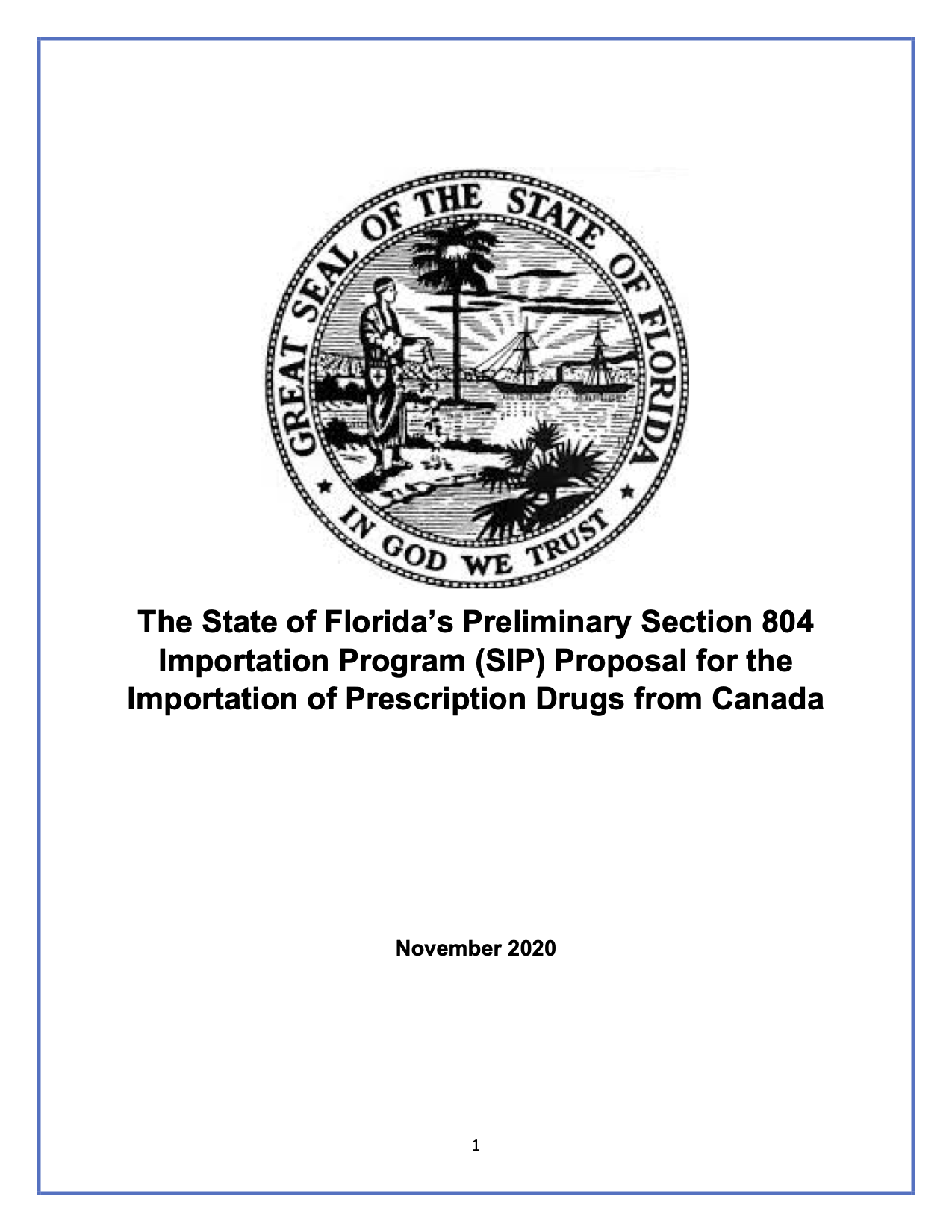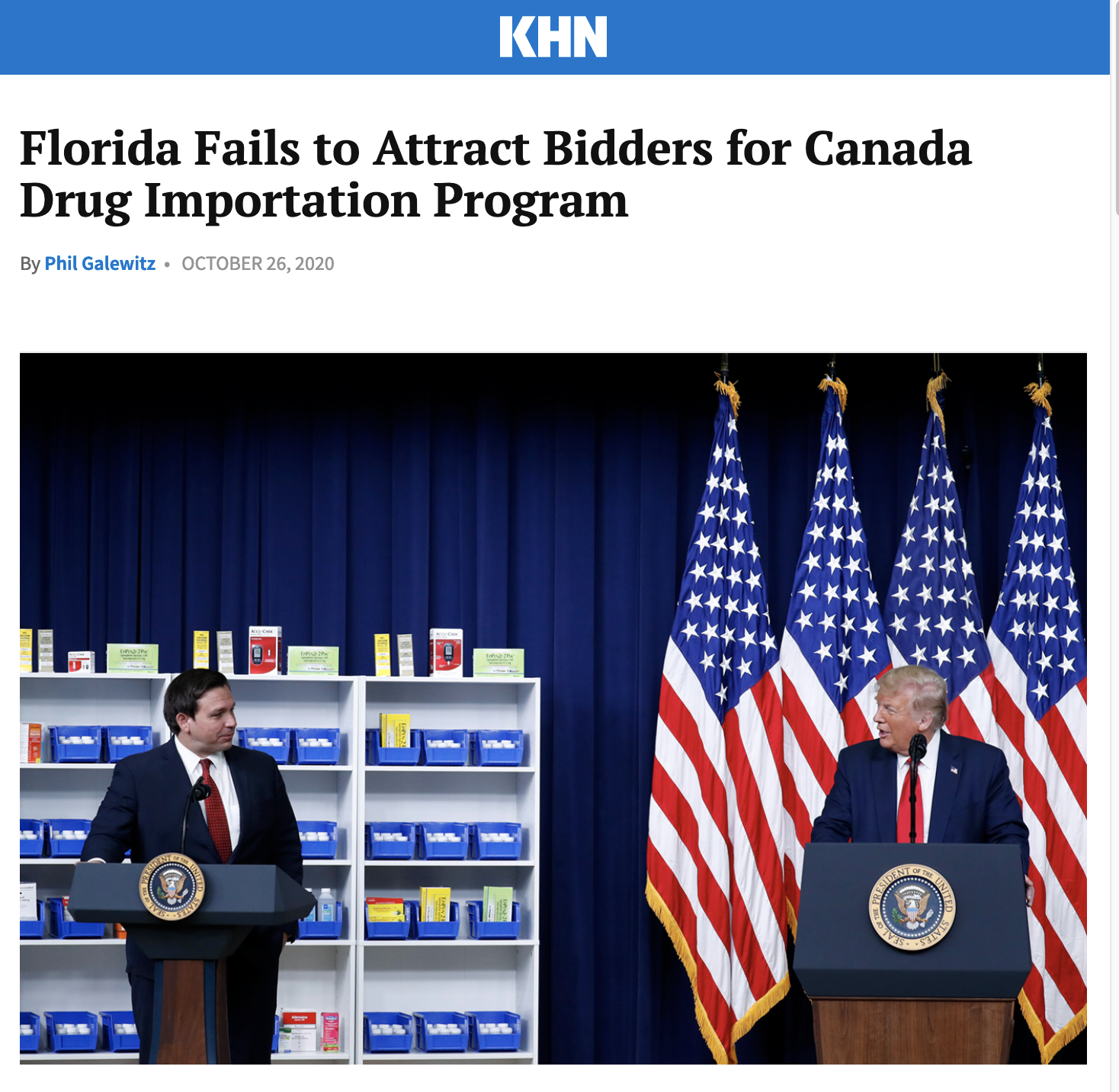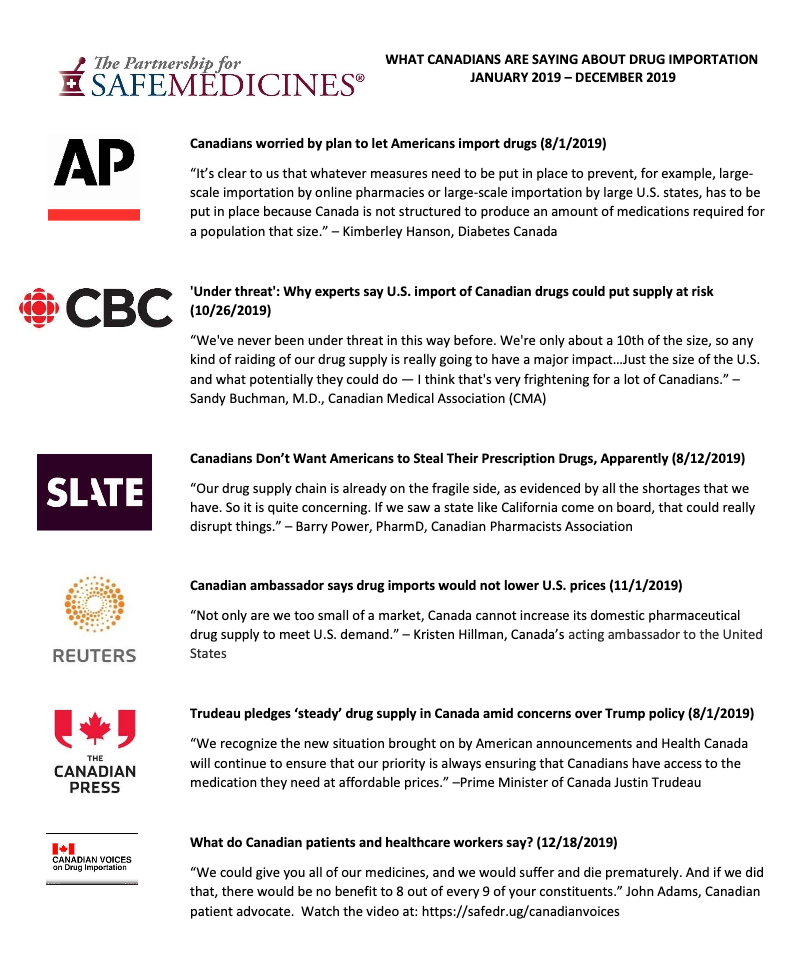The state of Florida recently submitted its Canadian drug importation program to the Department of Health and Human Services (HHS). After comparing the plan Florida submitted to the bill passed by Florida’s legislature, we cannot ignore the glaring failures of the state to meet federal requirements, its own requirements, and promises made during the legislative process.
There Is No Safety Safety Guarantee in This Plan
In its submission to HHS the state of Florida asserts that it will “not be necessary to perform statutory testing” on imported drugs. This is mind-boggling. The Medicare Prescription Drug Modernization Act of 2003 requires that each batch of prescription drugs be statistically sampled for authenticity and degradation. Florida legislators were trying to move these goalposts for safety testing even while they were crafting the bill. The law Florida enacted said that only each initial shipment of a specific drug would be tested, then the state would test every other shipment. Now, the state has decided it does not need any safety goalposts at all.
Not only is testing required by Florida and federal law, but the bill’s sponsors repeatedly promised testing to legislators during debate on the bill. We've excerpted these quotes from Senator Aaron Bean in our video:
“So if Canada imports a drug from another country and then they come to Florida, we will inspect every batch … And of course members, that’s part of U.S. Law. We’re not going to violate any part of U.S. law or Canada law to implement this program.” Statement by Senator Bean at March 25, 2019 hearing at ~01:20:30
“So we’re having labs open it, test it, take it apart, look at it, do analytics to test its potency, its reliability, to make sure it hasn’t been tampered with at all.” Statement by Senator Bean at April 18, 2019 hearing at ~02:20:50
You may wonder why we didn't use the exact footage of Senator Bean making these promises in our video.
It is a misdemeanor in the state of Florida to use any of the legislative television recordings in any kind of advocacy, so we paid a voice actor to read Senator Bean's quotes from the hearing for this video.
Failed to Demonstrate Significant Savings to Consumers
One of the two requirements in the MMA for any state-sponsored Canadian prescription drug importation is that the customer will see significant savings. Since Florida only intends to import drugs that the state itself provides to prisoners, patients at free clinics, and other places, patients will not see any savings, let alone significant ones.
In its submission to HHS, the state says, “For the first year, the State is conservatively projecting that it can save between approximately $80 to $150 million. These savings will also benefit the federal government because less federal financial participation will be required for Medicaid.” The closest the state comes to demonstrating real consumer savings is to suggest that if the program expands to all of Florida’s residents, that the annual savings could be “hundreds of millions of dollars.”
Legislators Were Promised a Second Review
As HB-19 made its way through the Florida State Legislature, senators and representatives were promised that the bill would come back to the legislature if the state’s plan received approval from HHS. Florida’s legislators wanted to make certain the program was still a good idea for Florida residents. However, that vote never happened. The state of Florida ignored that promise and has already funded a three-year $30M contract, which as of the writing of this has still not been awarded.
The state cut a billion dollars from other programs in its 2020-2021 budget. but earmarked $10 million for this unproven idea.
Issues with Florida’s List of Medications to Import
The state of Florida’s submission included a list of 47 prescription drugs in a total of 102 dosages. However, 13 of these medications were generics, which the MMA says cannot be imported. Since generics cost less than brand name drugs, one can eliminate the corresponding nine brand name versions of those generics that are also on Florida’s list. Now, the state’s list is down to a total of 25 different medications in a total of 35 different dosages. Two of the drugs left on the list, Harvoni and Epclusa, already have generic versions on the market, so the state can easily save money on those drugs.
A dozen of the remaining drugs are specialty drugs, which have a smaller distribution chain than most other medications. Canada’s three major drug distributors (AmerisourceBergen, Cardinal Health, and McKesson) have voiced reservations about drug importation, which makes it unlikely that the state will be able to contract with an exporter who has access to those drugs. If the state of Florida is unable to import any of the specialty drugs, only 11 drugs will remain, and the pool of patients that would see any benefit from Florida’s plan would shrink dramatically.
Kaiser Health News wrote about Florida's failure to attract bidders for the importation contract in October 2020.
Canada Continues to Reject the Concept of Drug Importation
Canada has said it does not have the supply to be America’s medicine cabinet since the MMA made the idea of state-sponsored Canadian drug importation a possibility. In 2005, a proposed bill would have allowed Canada’s Health Minister to ban the bulk exportation of prescription drugs to the U.S. That bill never passed because the U.S. states stopped pushing the issue. When states began pushing again, Canada continued to push back, even submitting a comment to HHS during the proposed rulemaking comment period in which the Government of Canada warned that drug importation “would not provide an effective solution to high drug prices in the U.S. As the federal government continued pressing forward with the issue, Canada imposed an interim order in November 2020 banning the export of prescription drugs that would cause or exacerbate drug shortages in that country.
How Florida or any other state thinks they can have a Canadian drug importation plan without the support of Canada is beyond comprehension.
No savings, no safety, broken promises, very limited drug options, and Canada is not on board with the idea: these things do not sound like a recipe for success.
Florida is wasting taxpayers’ money and would be better off finding other ways to help lower the cost of prescription drugs for all Floridians.


